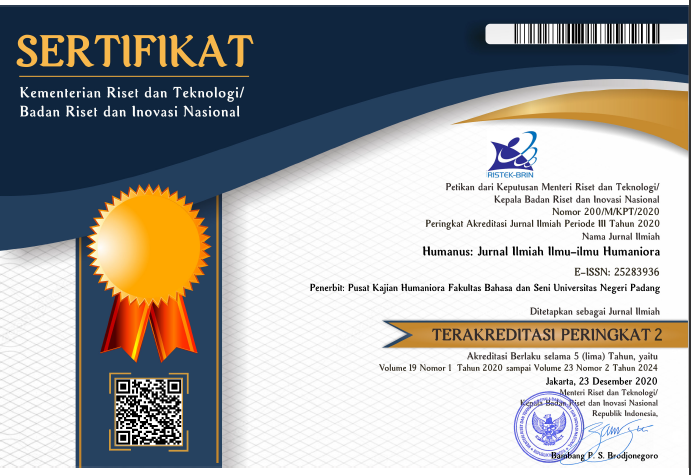Expressions of Violence against Women in French Novel Syngué Sabour and the Indonesian Translation
 ),
), (1) Universitas Gadjah Mada
(2) Universitas Gadjah Mada
 Corresponding Author
Corresponding Author
Copyright (c) 2022 Humanus
DOI : https://doi.org/10.24036/humanus.v21i2.116814
Full Text:
 Language : en
Language : en
Abstract
Abstract
Violence against women is a gender issue that often appears in literary works. In cases where those works become translated, this theme may experience shifts in context from the source text to the target text, which can cause a shift in meaning as well. This research aims to discern how expressions of violence against women as narrated in a source text become translated into the target text. In this qualitative descriptive study, data in the forms of words, phrases, or sentences denoting violence against women have been taken from the French novel Syngué Sabour and its Indonesian translation, Batu Kesabaran. The results show that the expressions related to verbal and sexual violence were translated by means of overlexicalization. The translator employed this strategy to place emphasis on the problems raised, although the results give the impression that the translator portrays women in an exceedingly inferior and negative manner. On the other hand, expressions related to physical violence, murder, and human trafficking tend to use a more neutral language. This is true since the issue of violence against women in literary works can be seen not only through the chosen diction but also through the characters’ actions and behaviors.
Keywords
References
Andone, O. (2010). Gender issues in translation. Perspectives: Studies in Translatology, 10(2), 135–150. https://doi.org/10.1080/0907676X.2002.9961439
Berger, A. E. (2020). Le genre de la traduction: Introduction. De Genere, 5, 1–12.
Cholsy, H., & Firmonasari, A. (2018). « Syngué Sabour. Pierre de Patience »: La question du genre et la traduction. 3. Yogyakarta: Digital Press Social Sciences and Humanities. https://doi.org/10.29037/digitalpress.43297
Cortright, D., & Wall, K. (2012). Afghan Women Speak (p. 40). Indiana: University of Notre Dame.
Creswell, J. W., & Creswell, J. D. (2018). Research design: Qualitative, quantitative, and mixed methods approaches (Edisi Kelima). Los Angles: Sage.
Flood, M., Gardiner, J. K., Pease, B., & Pringle, K. (2007). International Encyclopedia of Men and Masculinities (1st ed.). London: Routledge.
Fowler, R. (1986). Linguistics Criticism. New York: Oxford University Press.
Fowler, R. (1991). Language in the News: Discourse and Ideology in the Press. London: Routledge.
Fowler, R., Hodge, B., Kress, G., & Trew, T. (1979). Language and control. London: Routledge & Kegan Paul.
Frequently asked questions: Types of violence against women and girls | UN Women. (n.d.). Retrieved 10 December 2021, from https://www.unwomen.org/en/what-we-do/ending-violence-against-women/faqs/types-of-violence
Hoed, B. (2006). Penerjemahan dan Kebudayaan. Bandung: PT. Dunia Pustaka Jaya.
Human Rights, United Nations Assistance Mission in Afghanistan, Office of the United Nations High Commissioner for Human Rights. (2009). Silence is violence (p. 39). Kabul. Retrieved from https://www.ohchr.org
Human Rights, United Nations Assistance Mission in Afghanistan, Office of the United Nations High Commissioner for Human Rights. (2010). Harmful Traditional Practices and Implementation of the Law on Elimination of Violence against Women in Afghanistan (p. 76). Kabul. Retrieved from https://www.ohchr.org
Kabar Perempuan. (2021). Retrieved 12 December 2021, from Komnas Perempuan | Komisi Nasional Anti Kekerasan Terhadap Perempuan website: https://komnasperempuan.go.id/kabar-perempuan
Larousse Dictionnaire Français. (n.d.). Retrieved from https://www.larousse.fr/dictionnaires/francais
Manggarrani, M. D., Nababan, M. R., & Santosa, R. (2019a). Analisis perbandingan terjemahan ungkapan yang mengandung sikap seksis antartokoh laki-laki dan perempuan dalam novel Ronggeng Dukuh Paruk. Linguistik Indonesia, 37(2), 145–158. http://dx.doi.org/10.26499/li.v37i2.105
Manggarrani, M. D., Nababan, M. R., & Santosa, R. (2019b). Translation analysis of sexist attitudes in Ronggeng Dukuh Paruk novel. Mozaik Humaniora, 19(2), 194–204. http://dx.doi.org/10.20473/mozaik.v19i2.13230
Matradewi, N. K. W. (2019). Konstruksi Diatesis Medial Bahasa Prancis dan Dinamika Penerjamahannya Pada Novel Bahasa Indonesia Dalam Analisis Linguistik Kritis (Dissertation). Universitas Gadjah Mada, Yogyakarta.
Mokoginta, F. I. (2012). Batu Kesabaran. Yogyakarta: Jalasutra.
Nababan, M. R. (2007). Aspek genetif, objektif, dan afektif daam penelitian penerjemahan. Linguistika, 14(26), 15–23.
OHCHR | Declaration on the Elimination of Violence against Women. (1993). Retrieved 8 December 2021, from https://www.ohchr.org/en/professionalinterest/pages/violenceagainstwomen.aspx
Rahimi, A. (2008). Syngué Sabour. Paris: P.O.L.
Rao, N. (2005). Questioning Women’s Solidarity: The Case of Land Rights, Santal Parganas, Jharkhand, India. The Journal of Development Studies, 41(3), 353–375. https://doi.org/10.1080/0022038042000313282
Rochmawati, D. (2014). The domestic violence against Afghan women in atiq rahimi’s the Patience Stone: A feminist new historicism reading. Prosodi, 8(2), 1–13. https://doi.org/10.21107/prosodi.v8i2.315
Sajarwa. (2021). Translation Ideology of French Novels Into Indonesian In Colonial and Postcolonial Period. Journal of Applied Linguistics and Literature, 6(2), 330–347. https://doi.org/10.33369/joall.v6i2.15372
Semahegn, A., & Mengistie, B. (2015). Domestic violence against women and associated factors in Ethiopia; systematic review. Reproductive Health, 12(78). https://doi.org/10.1186/s12978-015-0072-1
Simon, S. (1996). Gender in Translation. London: Routledge.
Srivastava, K., Chaudhury, S., Bhat, P. S., & Sahu, S. (2017). Misogyny, feminism, and sexual harassment. Industrial Psychiatry Journal, 26(2), 111–113. https://doi.org/10.4103/ipj.ipj_32_18
Wang, Y., Yu, X., & Chen, Q. (2019). Translation and negotiation of gender stereotypes: Metamorphosis of female characters in the English version of a Chinese classical novel. Perspectives: Studies in Translatology, 28(5), 702–716. https://doi.org/10.1080/0907676X.2019.1663887
 Article Metrics
Article Metrics
 Abstract Views : 565 times
Abstract Views : 565 times
 PDF Downloaded : 265 times
PDF Downloaded : 265 times
Refbacks
- There are currently no refbacks.
Copyright (c) 2022 Humanus

This work is licensed under a Creative Commons Attribution-NonCommercial 4.0 International License.










